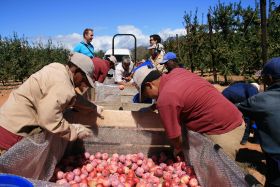
“Reconstruction goes hand in hand with reconciliation.”
By all accounts this philosophy, spoken by Nelson Mandela at the 1996 Cape Town thanksgiving for Archbishop Desmond Tutu, helped to dismantle apartheid and establish some form of building block for the future of South Africa.
So perhaps it is no coincidence that collaboration, not confrontation, is at the forefront of the ethical trade initiative that will drive future growth and development in the South African fruit industry.
South Africa has achieved a largely unlauded world first in creating an audit that meets strict international standards for ethical trade but is also embedded in South African traditions and law.
As well as reaching the milestone of global acceptance, the Sustainability Initiative of South Africa (SIZA), has relieved growers from the arduous and expensive burden of individual retailers’ ethical audits.
In the past, they would complete an audit for each international buyer. Now, thanks to the acceptance of SIZA by most global retailers minus a few latecomers, they only have to do one.
But SIZA’s significance goes much further than negotiating global beaurocratic minefields, or cutting audit fatigue among growers. It is built on an ethos of non-confrontation that is linked to SIZA’s approach to the recent labour relations situation in South Africa.
Although it will eventually expand to include other compliance areas such as environmental standards, SIZA has started with ethical trade as an area of recent pressure.
Colleen Chennells, SIZA national coordinator, tells FPJ that it is important that auditing ethical standards on South African farms is not a threatening process. She says it is about encouraging an honest and constructive response from growers, who in turn benefit from the programme by being able to differentiate themselves from non-compliant farms, as well as meet the required standards for retailers.
“When we started the ethical trade initiative there was a lot of pressure from buyers, largely from the UK, looking for ethical compliance from their supply base,” says Chennells. “This in turn had risen out of a lot of publicity around alleged poor practice on farms in South Africa. To some degree, all that pressure pushed people into feeling a bit defensive about what they had. Instead of being honest about what is happening on the ground people became defensive.”
Opting into SIZA is voluntary, but despite this membership reached over 600 in the first year of being operational. Chennells credits its supportive ethos for the encouraging take-up figures: “What we tried to create with SIZA is a platform where people can come together, and start to see what are the issues and where are the issues. And if there are issues what do we need to do about them, and how do we work collaboratively with growers.
“This is not about cancelling contracts, it’s not a pass or fail exercise, this is about an intention to improve. It’s not looking at each other from different sides of the fence, it’s actually saying we’re all on the same side of the fence, we want the same things.”
Such an approach might seem soft in comparison with the UK’s own Gangmasters Licensing Authority (GLA), which has recently ramped up its campaign to vigorously remove and expose labour suppliers who are exploiting workers.
But it is not the first time South Africa has tried to use a non-confrontational way of overcoming past inequalities and tensions.
The idea of positive reconciliation to create real change resonates with Mandela’s legacy, and perhaps has never been so poignant during this first year after his death.
And arguably there are tensions to overcome. Over the past few years fruit farms in the Western Cape have been the target for violent strike action. In 2012, there was reportedly widespread damage to many farms, with growers describing the situation as “out of control”.
In November of last year the strikes returned, and although the damage was reportedly not as great, there were signs of unrest and some violent clashes.

As well as the disruption, Anton Rabe, chief executive of trade body Hortgro, says the subsequent 52 per cent wage hike that occurred after these latest strikes put a strain on the industry.
He stresses that it’s time to look at the whole supply chain when discussing labour costs. “On average only 25 per cent of the end product’s value goes to the farm, out of which seven per cent is spent on labour and two per cent goes to the owner,” he says.
“The debate needs to move away from on-farm costs because there is nothing left to share. We need to unlock returns from the other 75 per cent.”
But this important debate can’t happen without clear routes of interaction between workers and farmers. Communication is one of SIZA’s selling points by allowing people to voice ethical concerns and training ethical trade facilitors (ETFs) who implement ethical standards on a local level.
“One of the major areas of non-compliance picked up through audits has been communication,” says Chennells. “I think where you don’t have communication that is where issues fester and then express themselves in alternative actions like strike action.
Some South African farms are already using transparency and collaboration to create better worker relations. Manager of Black Economic Emergence (BEE) farm Pikkie Grobler says his workers are trained to read a financial document for this reason.
“So if someone wants a pay rise we can sit down and show them the books and say look we can’t do it at the moment. We are very visible in that way,” he says.
Chennells adds: “Training workshops will enable this collaborative ethos to be rolled out more widely. With SIZA we are trying to move away from an audit for the sake of an audit. What we will do is train the people who are really working on farms.”
SIZA provides the framework that could allow the South African fruit industry to move forward economically and ethically carrying all of those involved in the industry with it, and in doing so maintain its competitive edge alongside other global production areas.
Speaking to Eurofruit last December, chairman of the SA Apple and Pear Association Nicholas Dicey paid tribute to Mandela’s commitment to adopting free market policies, and creating the environment of reconciliation that was required to transform the country.
“This opened up incredible opportunities for the fruit industry in global markets,' Dicey said. 'The growth in our export industry over the past two decades is evidence of this.”
Mandela’s belief in reconciliation re-opened external markets for South African produce, but maybe it’s time for the same philosophy to transform the internal labour relations situation and take the industry into its next era.



